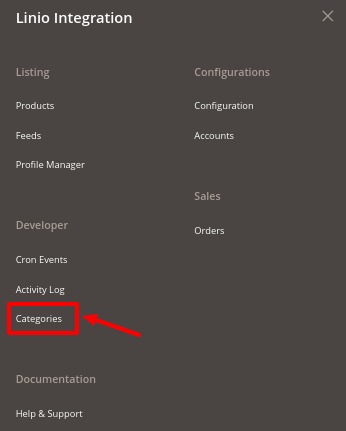Manage Linio Categories

To manage Linio Categories,
- Go to the Magento Admin panel.
- On the left navigation bar, click the Linio Integration menu.
The menu appears as shown in the following figure:
- Click on Categories.
The Linio Categories page appears as shown below:
- Now in order to sync the Linio categories with your Magento 2 store categories, click on Sync Categories Button on the top.

- Now Click on the Sync Attributes button, which will import and synchronize all the Linio attributes into your Magento 2 store:

- The Linio categories and Attributes start getting reflected in your Magento panel.
- If you wish to remove the previous categories or make amends, Click on the Truncate Button in the top right corner:

All the previous categories will get removed.
Related Articles
Manage Linio Feeds
To manage feeds, Go to the Magento Admin panel. On the left navigation bar, click the Linio Integration menu. The menu appears as shown in the following figure: Click on Feeds. The Feed Manager Page appears as shown below: The Linio feeds will appear ...Manage Linio Crons
A cron job is a program that updates or repeats the given tasks at a fixed interval. This automatic job scheduler is not visible as it runs in the background of the Magento store. To manage cron logs, Go to the Magento Admin panel. On the left ...Manage Orders
To manage orders, Go to the Magento Admin panel. On the left navigation bar, click the Linio Integration menu. The menu appears as shown in the following figure: Click on Orders. The Manage Order Grid appears as shown below: Click on Fetch All ...Manage Profiles
Product Profiling is a process of arranging similar types of products from a catalog and bundling them to perform multiple bulk actions. Let’s say you are selling Clothing – you create a profile labeled as Men’s T-shirts and add all the t-shirts in ...Linio Integration Extension Installation
You can do it manually (if you wish). Here’s how to do so- To install the extension Log in the FTP, and then go to Magento 2 root folder (generally present under the public_html folder). Create a new folder named code under the app folder; under the ...